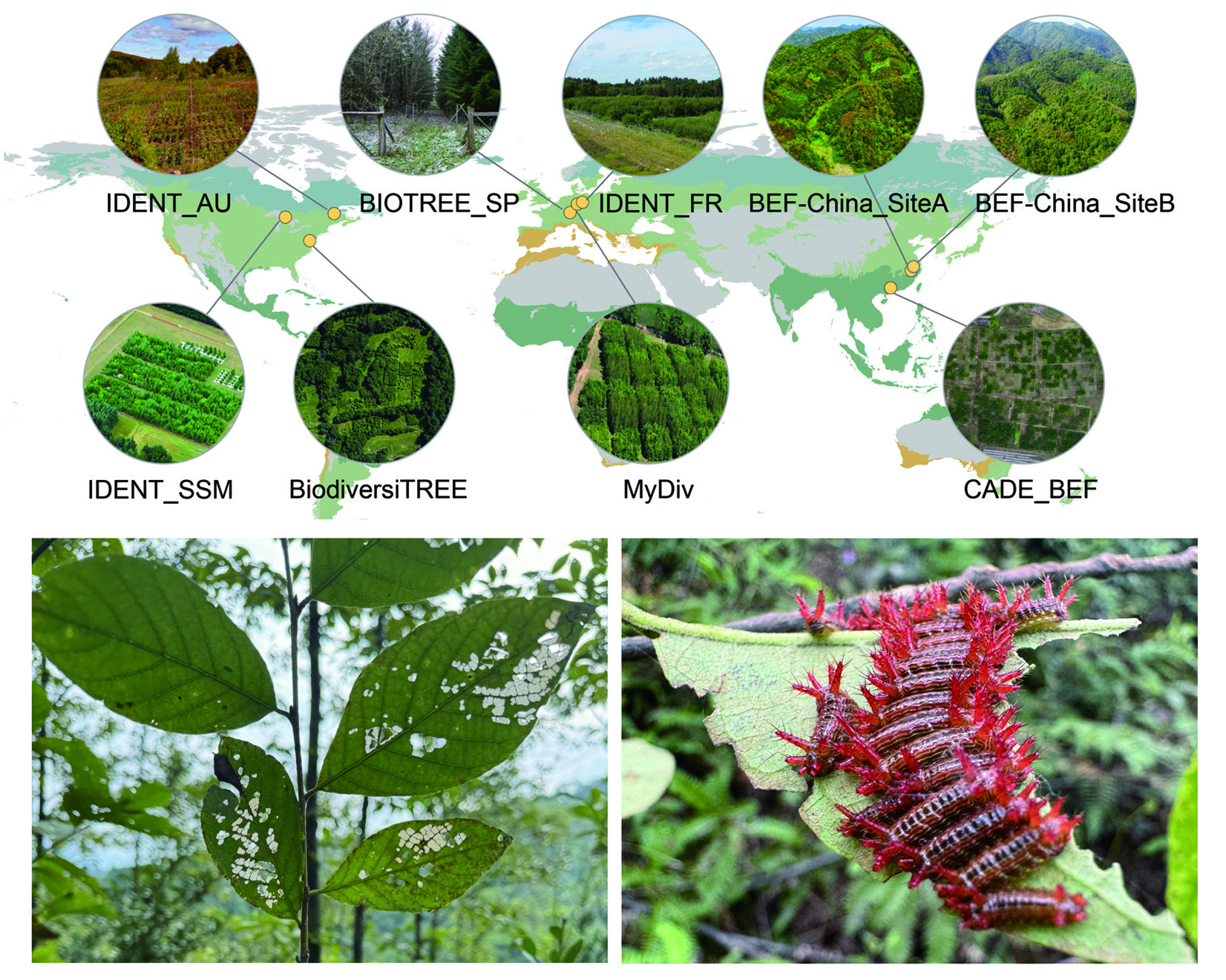A new study published on Nature Ecology & Evolution has revealed a positive relationship between tree growth and insect herbivory, as well as between tree species richness and herbivory.
The research, conducted by an international team of scientists and led by Prof. LIU Xiaojuan from Institute of Botany, the Chinese Academy of Sciences (IBCAS), based on data from 8,800 trees across 80 species in nine biodiversity experiments from Tree Diversity Network (TreeDivNet) in various biomes. As the world's forests face increasing threats from climate change, deforestation, and insect outbreaks, understanding the complex relationships between trees, insects, and their environment is crucial for developing effective management strategies.
"Our study provides critical insights into the complex dynamics of plant-herbivore interactions and offers valuable guidance for forest management and restoration strategies," said Prof. LIU Xiaojuan, senior author of the study.
The study found that tree species richness increased insect herbivory from individual to species to community level. It also found that the relationship between tree growth and herbivory was strongly influenced by tree functional traits, such as leaf nutrient contents and leaf texture. This means that trees with certain characteristics, such as higher C:N ratio and tougher leaves, are more vulnerable to herbivores as their growth rate increases.
"These findings highlight the importance of considering functional traits in understanding plant-herbivore interactions, as it suggests that efforts to promote tree growth and biodiversity may need to be tailored to the specific characteristics of the trees and the environment" said Dr. LI Yi, the study's first author. She also explained that the observed positive associations stem not only from increased productivity (i.e., more food resources) in species-rich environments, but also because generalist herbivores benefit from the diverse array of food sources available in such habitats.
An important next step for the researchers will be to understand how the observed relationships apply under conditions of environmental stress and insect outbreak situations. "It's important to note that our current study primarily focused on natural background rates of herbivory" stated by Prof. Andreas Schuldt, a core author of the study. "Outbreaks and severe tree damage are often caused by specialized herbivores under environmentally stressful conditions, and we may see deviating effects of tree species richness in such cases."
This study not only confirms a global pattern of positive relationships between tree growth and herbivory, but also underscores the critical influence of functional traits. These findings hold significant implications for understanding the intricate dynamics of plant-herbivore interactions and their fundamental role in ecosystem energy flow.

Figure 1. Locations of the nine forest biodiversity experiments from TreeDivNet, and insect herbivory and herbivore insects (Limacodidae, Lepidoptera) in one of the experiments (BEF-China) (Image by LI Yi).
A new study published on Nature Ecology & Evolution has revealed a positive relationship between tree growth and insect herbivory, as well as between tree species richness and herbivory.
The research, conducted by an international team of scientists and led by Prof. LIU Xiaojuan from Institute of Botany, the Chinese Academy of Sciences (IBCAS), based on data from 8,800 trees across 80 species in nine biodiversity experiments from Tree Diversity Network (TreeDivNet) in various biomes. As the world's forests face increasing threats from climate change, deforestation, and insect outbreaks, understanding the complex relationships between trees, insects, and their environment is crucial for developing effective management strategies.
"Our study provides critical insights into the complex dynamics of plant-herbivore interactions and offers valuable guidance for forest management and restoration strategies," said Prof. LIU Xiaojuan, senior author of the study.
The study found that tree species richness increased insect herbivory from individual to species to community level. It also found that the relationship between tree growth and herbivory was strongly influenced by tree functional traits, such as leaf nutrient contents and leaf texture. This means that trees with certain characteristics, such as higher C:N ratio and tougher leaves, are more vulnerable to herbivores as their growth rate increases.
"These findings highlight the importance of considering functional traits in understanding plant-herbivore interactions, as it suggests that efforts to promote tree growth and biodiversity may need to be tailored to the specific characteristics of the trees and the environment" said Dr. LI Yi, the study's first author. She also explained that the observed positive associations stem not only from increased productivity (i.e., more food resources) in species-rich environments, but also because generalist herbivores benefit from the diverse array of food sources available in such habitats.
An important next step for the researchers will be to understand how the observed relationships apply under conditions of environmental stress and insect outbreak situations. "It's important to note that our current study primarily focused on natural background rates of herbivory" stated by Prof. Andreas Schuldt, a core author of the study. "Outbreaks and severe tree damage are often caused by specialized herbivores under environmentally stressful conditions, and we may see deviating effects of tree species richness in such cases."
This study not only confirms a global pattern of positive relationships between tree growth and herbivory, but also underscores the critical influence of functional traits. These findings hold significant implications for understanding the intricate dynamics of plant-herbivore interactions and their fundamental role in ecosystem energy flow.

Figure 1. Locations of the nine forest biodiversity experiments from TreeDivNet, and insect herbivory and herbivore insects (Limacodidae, Lepidoptera) in one of the experiments (BEF-China) (Image by LI Yi).
